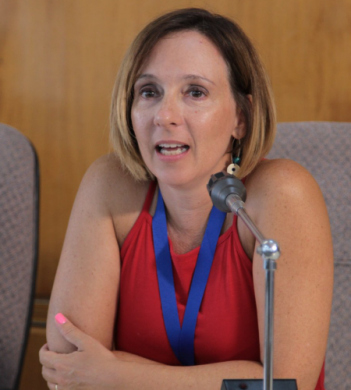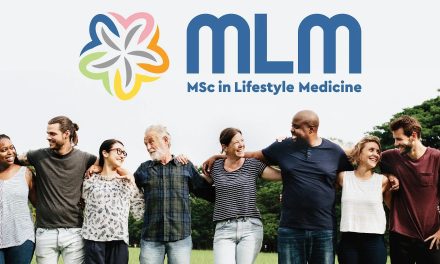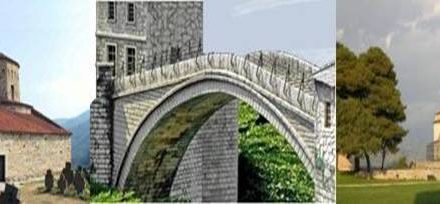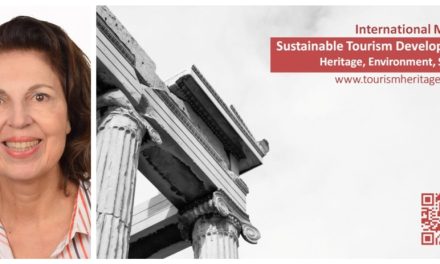The web portal Study in Greece is campaigning for the promotion and international visibility of Greek Universities and the comparative educational advantages of our country. In particular, the campaign focuses on the foreign language study programmes that Greek Universities offer to Greek and international students. The initiative is supported by the General Secretariat of Higher Education of the Ministry of Education and Religious Affairs and the General Secretariat for Greeks Abroad and Public Diplomacy of the Ministry for Foreign Affairs. In this context, a number of educational programmes and actions are presented in detail on a regular basis, such as undergraduate and postgraduate programmes, summer schools etc, to inform international students about the many foreign language options offered by Greek Universities.
Study in Greece interviewed Professor Marina Mattheoudakis, of the Department of Theoretical & Applied Linguistics at the School of English of the Aristotle University of Thessaloniki (AUTh), on the MA programmes of the Department, their features and what they have to offer to international students.
 Dr Marina Mattheoudakis is Professor at the Department of Theoretical and Applied Linguistics at the School of English of the Aristotle University of Thessaloniki. She has taught English as a foreign language for 10 years in all levels of education. She currently teaches courses in methodology of language teaching, second language vocabulary acquisition and corpus linguistics (at the undergraduate level) and in linguistics for language teaching (at the postgraduate level). Since her employment at the School of English she has been actively involved in the organisation of the teacher training courses of the department and has offered several courses on various topics related to the teaching of English. Her main research interests are in the areas of teaching methodology, mental lexicon, lexicology and corpus linguistics.
Dr Marina Mattheoudakis is Professor at the Department of Theoretical and Applied Linguistics at the School of English of the Aristotle University of Thessaloniki. She has taught English as a foreign language for 10 years in all levels of education. She currently teaches courses in methodology of language teaching, second language vocabulary acquisition and corpus linguistics (at the undergraduate level) and in linguistics for language teaching (at the postgraduate level). Since her employment at the School of English she has been actively involved in the organisation of the teacher training courses of the department and has offered several courses on various topics related to the teaching of English. Her main research interests are in the areas of teaching methodology, mental lexicon, lexicology and corpus linguistics.
She has also been invited by the British Council, TESOL Macedonia-Thrace, and school advisors to give teacher training courses to practicing English language teachers in Macedonia, Thrace and Thessaly. She is currently one of the scientific coordinators of the Teacher Training Courses offered by the School of English at AUTh.
Please describe us briefly what the Master’s degree in Theoretical and Applied Linguistics deals with?
The School of English Language and Literature offers three MA programmes related to the field of Theoretical and Applied Linguistics:
(a) The MA in Linguistics aims to provide students with a robust background in theoretical linguistics and key skills that will enable them to conduct independent research in linguistics. Students will acquire an up-to-date knowledge on major theoretical frameworks and models as well as important methodological issues and procedures in linguistic research so that they can carry out basic research on different linguistic levels and their interface, as well as applied research in, among others, language teaching, language technology, speech pathology, etc.
(b) The MA in Language, Literature and Digital Media in Education aims to combine the theoretical principles and practices for the teaching of English as a Foreign Language (EFL) and the integration of literature as a fundamental element in the educational process. Its goal is to promote implicit language instruction while successfully implementing literary texts for the teaching of primary and secondary level students. An additional goal of this MA programme is to educate teachers on the use of digital media in English Language Teaching (EFL).
(c) The MA in Foreign Language Learning and Teaching aims to connect theory and practice in language teaching. It aims to provide the opportunity to postgraduate students to explore and examine issues related to language learning theories as well as their importance for language teaching.
The programme is designed for people with teaching experience who wish to learn about the latest developments in the field of learning and teaching second/foreign language. There are three compulsory courses offered that cover the following cognitive areas: Second/Foreign Language Learning, Educational Linguistics and Research Methods. In addition to the core courses, the postgraduate students can choose from a variety of elective courses depending on the capabilities of the Department and/or the students’ options.
 Could you tell us why this programme aims at international students?
Could you tell us why this programme aims at international students?
All MA programmes of the department of Theoretical and Applied Linguistics are suitable for international students, first of all because they are offered exclusively in English.
The Department of Theoretical and Applied Linguistics is the largest in the School of English with research specialisations in phonetics, phonology, syntax, semantics, pragmatics, typology, cognitive linguistics, historical linguistics, teaching methodology, teaching and learning a second/foreign language. The Department offers a variety of courses in all these areas.
Teaching and research is further enhanced by three departmental laboratories — Language Development, Phonetics and Foreign Language Teaching Laboratories — as well as the Experimental Primary School at Evosmos associated with the Department.
Since 1987, the Department has been organising the International Symposium on Theoretical and Applied Linguistics (ISTAL) on an annual and, more recently, on a biennial basis. ISTAL is a well- established event both in Greece and abroad attracting renowned experts for the presentation of their research. A selection of articles presented at ISTAL is published in the journal Selected papers on theoretical and applied linguistics.
Given that in recent years there has been an effort for the extroversion and the internationalisation of Greek universities, do you believe that this programme wins the bet?
I firmly believe that the programme can attract international students; the department prides itself in its international networks, research profile and index of publications. Its faculty consists of highly qualified professors who have studied and worked both in Greece and abroad and whose academic expertise allows them to conduct cutting edge research.
 Which are the benefits for students by this programme and what prospects are opened up for the future of their careers?
Which are the benefits for students by this programme and what prospects are opened up for the future of their careers?
Our MA programmes are interdisciplinary and allow students not only to acquire a robust foundation in the science of linguistics but also to develop the skills and the attitude required to respond to the needs of 21st century. While some of the career prospects are related to education (e.g. teaching English in Primary and Secondary education), other career prospects relate to translation, publishing, interpretation, communication, among others).
Tell us a few things about the Aristotle University of Thessaloniki – its history, its departments, its facilities and its efforts to evolve within the contemporary global scientific and research environment.
The Aristotle University of Thessaloniki is the largest university in Greece. It comprises 10 faculties which consist of 40 schools and 1 single-School Faculty.
The facilities of the Aristotle University of Thessaloniki are located in the main campus and in the area of Thermi. Some educational and administrative facilities are located off campus for practical and operational reasons. A number of these facilities are located outside the city of Thessaloniki or even in other cities.
The School of Visual and Applied Arts and the School of Music Studies of the Faculty of Fine Arts, as well as the School of Physical Education and Sports Sciences are housed in facilities located in Thermi which cover about 21.3 hectares.
The School of Physical Education and Sports Sciences (in Serres) is located in the area of Agios Ioannis, whereas the School of Urban-Regional Planning and Development Engineering is located in Veroia. Some of the facilities off campus are:
- the clinics of the School of Veterinary Medicine (located near the new railway station, in 11 Stavrou Voutira str.)
- the university farm (it covers an area of 188.57 hectares and it is located near “Macedonia” Airport, 12km from the city centre)
- the facilities of the Faculty of Forestry and Natural Environment located in Foinikas, Thessaloniki, where the Wildlife Museum and the Forest Botanic Garden are housed
- the archaeological excavations [in Vergina, Dion, Pella, Philippoi (Kavala), Karabournaki, and Toumba (Thessaloniki)]
- the Centre for Byzantine Research (in 36 Vas. Olgas str.)
- the Teloglion Foundation of Art (in 159A Agiou Dimitriou str.) and the Seismological Station (in 43 Vizoukidis str., in the area of 40 Ekklisies)
- the Mount Olympus Meteorological Stations
- the University camp of Kalandra and
- the University Forest Reserves in Pertouli, on the Pindos mountain range, and in Taxiarchis, located in Vrasta (Chalkidiki), which serve the research and practice needs of the students of the Faculty of Forestry and Natural Environment.
 AUTh is the largest University in Greece covering all disciplines. It is widely recognised as a vibrant centre of learning which draws its inspiration from a long tradition of academic achievement. This can be supported, among other factors, by the fact that so much in science, as in the arts and divinity, medicine and technology, it prides itself in its international role. Most of its academic personnel have been trained in reputable Universities in Europe, the United States and as far afield as Australia and Japan. The University has been actively participating in the Erasmus Programme since 1987, accounting approximately one fourth of the total Erasmus mobility in Greece in the frame of Student for Studies Mobilities as well as Staff for Teaching Mobilities.
AUTh is the largest University in Greece covering all disciplines. It is widely recognised as a vibrant centre of learning which draws its inspiration from a long tradition of academic achievement. This can be supported, among other factors, by the fact that so much in science, as in the arts and divinity, medicine and technology, it prides itself in its international role. Most of its academic personnel have been trained in reputable Universities in Europe, the United States and as far afield as Australia and Japan. The University has been actively participating in the Erasmus Programme since 1987, accounting approximately one fourth of the total Erasmus mobility in Greece in the frame of Student for Studies Mobilities as well as Staff for Teaching Mobilities.
Nevertheless, mindful of rapid change and progress, we aim to improve our strategy, policies and everyday practices, in order to meet contemporary local and global demands. By assessing our experience, we have been able to determine our strengths and weaknesses, and we have adopted a holistic internationalisation strategy, the main objectives of which can be briefly described as follows:
– Strengthen our role in the European and international knowledge community by building upon collective and personal academic achievements.
– Enhance our visibility among the traditionally prestigious academic institutions all over the world, by establishing long-term cooperation schemes at research, education and training level.
– Reinforce our traditional presence as leading education and research institution in Southeastern Europe and Eastern Mediterranean, by building focused strategic partnerships in the area.
– Play a decisive role in academic exchange, good practices dissemination, and knowledge diffusion.
– Support multicultural co-existence, social and cultural cohesion, and promote sustainable regional development. – Make multilateral, rather than unilateral approach, a core aspect of our work in education, research and administrative level.
– Make our graduates able to think and act across traditional academic boundaries and across national borders. Properly equip them so that they may benefit from international knowledge and experience and support national and local dynamic development.
– Take into consideration global market demands and adjust respectively our educational policies. – Enhance our cooperation with commercial enterprises abroad in terms of internship offers in order to improve our students’ international employability.
– Enhance and reinforce our relation with Greek society.
 The Department of International Relations and the Department of European Educational Programmes are responsible for enhancing, organising and maintaining good relations between the Aristotle University and the international academic community, as well as for promoting the university abroad, with the aim to reinforce cooperation and communication in the field of teaching and research.
The Department of International Relations and the Department of European Educational Programmes are responsible for enhancing, organising and maintaining good relations between the Aristotle University and the international academic community, as well as for promoting the university abroad, with the aim to reinforce cooperation and communication in the field of teaching and research.
The above goals are met by participating in International Organisations, Unions and University Networks, coordinating and implementing Bilateral Agreements between the AUTh and universities all over the world, as well as by implementing the European Policy of the Aristotle University of Thessaloniki through the Erasmus+ programme and various other European Educational Programmes (Erasmus Mundus, Erasmus+ International etc.).
The UNESCO Chair on Education for Human Rights, Democracy and Peace, the UNESCO Chair and International Network of Water-Environment Centres for the Balkans, the UNESCO C2c Centre for Integrated Water Resources Management and the “Iason” Programme play an integral role in continually advancing the prestige of the Aristotle University of Thessaloniki.
Why is internationalisation important for Greece and how will it help both the economy and the development of Thessaloniki?
Thessaloniki is on the crossroads between Europe and Asia; between the Western and the Eastern world. The city itself combines elements of both worlds and this is reflected on its architecture, lifestyle, people. Throughout its history, Thessaloniki has been an international city attracting people from all over the world and this has always been reflected on its economy. Attracting younger people, university students, will allow Thessaloniki to expand and enrich its international profile, boost its economy and further reinforce networking with young researchers and academics from abroad.
Ν.Μ.














